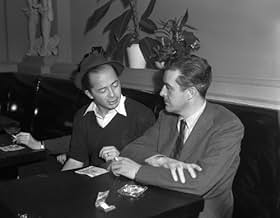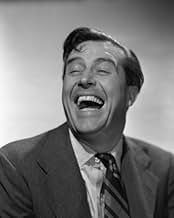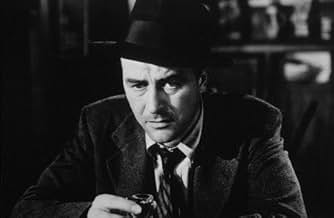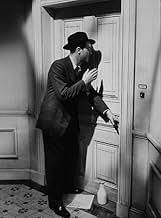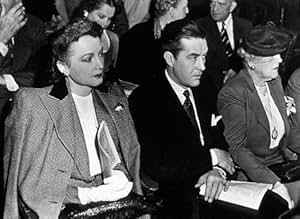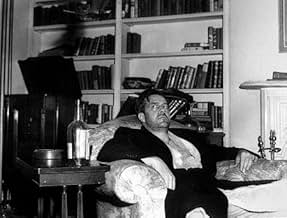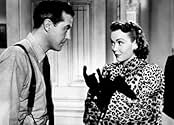PUNTUACIÓN EN IMDb
7,9/10
42 mil
TU PUNTUACIÓN
La desesperada vida de un alcohólico crónico, siguiendo una recaída constante de cuatro días.La desesperada vida de un alcohólico crónico, siguiendo una recaída constante de cuatro días.La desesperada vida de un alcohólico crónico, siguiendo una recaída constante de cuatro días.
- Dirección
- Guión
- Reparto principal
- Ganó 4 premios Óscar
- 18 premios y 3 nominaciones en total
Anita Sharp-Bolster
- Mrs. Foley
- (as Anita Bolster)
Andy Andrews
- Alcoholic
- (sin acreditar)
Gene Ashley
- Male Nurse
- (sin acreditar)
Walter Baldwin
- Man from Albany
- (sin acreditar)
Harry Barris
- Pianist at Harry & Joe's
- (sin acreditar)
Ian Begg
- Undetermined Secondary Role
- (sin acreditar)
Eddie Borden
- Drunk in Alcoholic Ward
- (sin acreditar)
Jess Lee Brooks
- Hospital Patient
- (sin acreditar)
Resumen
Reviewers say 'The Lost Weekend' is a groundbreaking film with a realistic portrayal of alcoholism. Ray Milland's performance as Don Birnam is praised for its depth. Billy Wilder's direction and the film's visual style, including deep focus and Miklós Rózsa's haunting score, effectively convey addiction's despair. However, some find it melodramatic and repetitive, with an unrealistic ending. Despite criticisms, it is regarded as powerful and influential in cinema.
Reseñas destacadas
10Don-102
From the first shot of a bottle hanging from a drunk's apartment, we realize we are about to see a clever addict and a weekend of his demented exploits. Ray Milland has an honest face, not unlike Jimmy Stewart's, however, with this character it is only skin-deep. The great thing about his performance and the film as a whole, is that his face will gradually change, becoming dark and chilly, just like Stewart's in IT'S A WONDERFUL LIFE. Stewart had lost his life momentarily. Milland has lost his soul to the bottle and he will stop at nothing to quench his thirst.
This really is a textbook example of the alcoholic's lies and schemes, a precursor to LEAVING LAS VEGAS, although there are people in this film who care about the drinker from the beginning. He just can't stop and we start to lose whatever sympathy we had for him because of how he treats other people. This is a drunk with a sober man wanting to come out, but Wilder's script dives deeply into the unpredictable outcomes of most alcoholics.
LOST WEEKEND was innovative and was almost never released because test audiences could not take the film's realism. The hospital sequence retains its horror, and Milland's withdrawal-induced hallucination of a rat in the wall was like him looking in the mirror. See this movie and you will come away with a completely informed and scary anthology of the antics of a hopeless alcoholic. This is amazing considering it came out of the old Hollywood system.
This really is a textbook example of the alcoholic's lies and schemes, a precursor to LEAVING LAS VEGAS, although there are people in this film who care about the drinker from the beginning. He just can't stop and we start to lose whatever sympathy we had for him because of how he treats other people. This is a drunk with a sober man wanting to come out, but Wilder's script dives deeply into the unpredictable outcomes of most alcoholics.
LOST WEEKEND was innovative and was almost never released because test audiences could not take the film's realism. The hospital sequence retains its horror, and Milland's withdrawal-induced hallucination of a rat in the wall was like him looking in the mirror. See this movie and you will come away with a completely informed and scary anthology of the antics of a hopeless alcoholic. This is amazing considering it came out of the old Hollywood system.
Powerful landmark film on alcoholism has lost none of its status...Ray Milland deserved his Oscar...
I take exception to previous comments that call the film "daring for its time" or "dated". It's still a very powerful film and there is nothing dated about the theme of a man who loses his soul to the bottle. It was a landmark film in its time and still is--there is no question about its holding power and the excellence of writing, acting and direction. Yes, even by today's standards! It outclasses more recent films dealing with alcoholism as it focuses on one man's problem with the bottle--a problem that affects all of the people whose lives he touches--particularly his loyal girlfriend (Jane Wyman in one of her best roles) and Philip Terry as his more conventional brother. The emotions are stark and real. The pity we feel for Milland's character is also mixed with disgust for his weakness. It's an accurate depiction of an alcoholic's struggle for the next fix--a never ending search for the next bottle. The pseudo-babble of a previous commentator attempts to inject disdain for the film as outdated and outclassed by more serious works. Nonsense! This was a stark and powerful film in 1945 and I have news for you--it is just as powerful and timely today! No other American film comes close to it. It is as searing an indictment of alcoholism as you are ever likely to see and Milland fully deserved his Oscar.
Seedy bars, pawnshops, and an array of elaborate hiding places are the overriding images from this film. The Lost Weekend is a grimly realistic account of four days in the life of a chronic alcoholic, played by Ray Milland. In films of this quality one always takes away unforgettable images. The most striking is Milland's drunken efforts to remember where in his apartment the last hiding place he used is. Degraded and thoroughly beaten by his addiction, his last refuge is to try and keep it a secret from those who still love him. Billy Wilder's direction and script is brilliant - sympathetic, but unpatronising in his handling of a delicate and rarely dealt with affliction. Not until Nicolas Cage's portrayal of a man determined to drink himself to death in Leaving Las Vegas, has alcoholism been dealt with so well. Milland's performance is first rate - no hammy shlurring of words - and the atmosphere is dark and seedy like the bars he frequents. The scene where he spends several hours trying to find an open pawnshop on a public holiday is both harrowing and dazzling - it is remeniscent of the filmic image of a parched man trying to cross the desert.
In 1968, I was just 22 years old and driving a taxi part-time in Ft. Lee, New Jersey. One day, I drove Charles Jackson (author of "The Lost Weekend") from Englewood Cliffs, NJ to a run-down hotel in Times Square, New York City. I had seen and really liked the movie of the same name, starring Ray Milland, who did a wonderful job portraying an alcoholic on a weekend binge. The film was so realistic, I had a strong feeling that Charles Jackson had written the book based on his own life. I got up the nerve to ask him, and he told me that....yes, he indeed was the alcoholic portrayed in his book. We talked quite a bit about his life on the way into Times Square. He seemed like a very nice person, although he seemed quite depressed. However, it still came as quite a shock when, shortly after having him in my cab, I read in the papers that he had hung himself in his hotel room in NYC. That's an experience I will never forget!
The script and score are superb and the acting flawless. Ray Milland is riveting in the role of a man who is as consumed by alcohol as it is consuming him. He lives and breathes for it and all around him become secondary including his long suffering girlfriend.
There is always a girl like this in the life of a good looking useless purposeless alcoholic kept afloat by either a wife or other family member, in this case a brother who pays the bills and tries to sober him up and dry him out periodically.
The score is relentless and highly avant Gard for its time, featuring music normally backing sci-fi flicks. Some of the scenes are profoundly frightening, his stay in the drunk tank with a sadistic feminine male nurse outlining all the horrors that await him and his DTs which feature a bat biting the head off a bird.
Very well done. I felt the ending was a little too pat, that would be my only fault with this.
9 out of 10. Excellent.
There is always a girl like this in the life of a good looking useless purposeless alcoholic kept afloat by either a wife or other family member, in this case a brother who pays the bills and tries to sober him up and dry him out periodically.
The score is relentless and highly avant Gard for its time, featuring music normally backing sci-fi flicks. Some of the scenes are profoundly frightening, his stay in the drunk tank with a sadistic feminine male nurse outlining all the horrors that await him and his DTs which feature a bat biting the head off a bird.
Very well done. I felt the ending was a little too pat, that would be my only fault with this.
9 out of 10. Excellent.
Oscars Best Picture Winners, Ranked
Oscars Best Picture Winners, Ranked
See the complete list of Oscars Best Picture winners, ranked by IMDb ratings.
¿Sabías que...?
- CuriosidadesBilly Wilder claimed the liquor industry offered Paramount Pictures $5 million not to release the film; he also suggested that he would have accepted had they offered it to him personally.
- PifiasWhen the waiter gives Don the check at Harry & Joe's and he reaches for it, the glass, ashtray, napkin, and cigarette all change position between camera shots.
- Citas
[Nat moves to wipe away the circle of whisky from Don Birnam's glass]
Don Birnam: Don't wipe it away, Nat. Let me have my little vicious circle. You know, the circle is the perfect geometric figure. No end, no beginning.
- ConexionesEdited into Cliente muerto no paga (1982)
- Banda sonoraLa Traviata
(1853) (uncredited)
Music by Giuseppe Verdi
Libretto by Francesco Maria Piave
Libiamo ne' lieti calici (Drinking Song) Performed by John Garris and Theodora Lynch with The San Francisco Opera Company
Selecciones populares
Inicia sesión para calificar y añadir a tu lista para recibir recomendaciones personalizadas
Detalles
Taquilla
- Presupuesto
- 1.250.000 US$ (estimación)
- Recaudación en todo el mundo
- 813 US$
- Duración1 hora 41 minutos
- Color
- Relación de aspecto
- 1.37 : 1
Contribuir a esta página
Sugerir un cambio o añadir el contenido que falta


